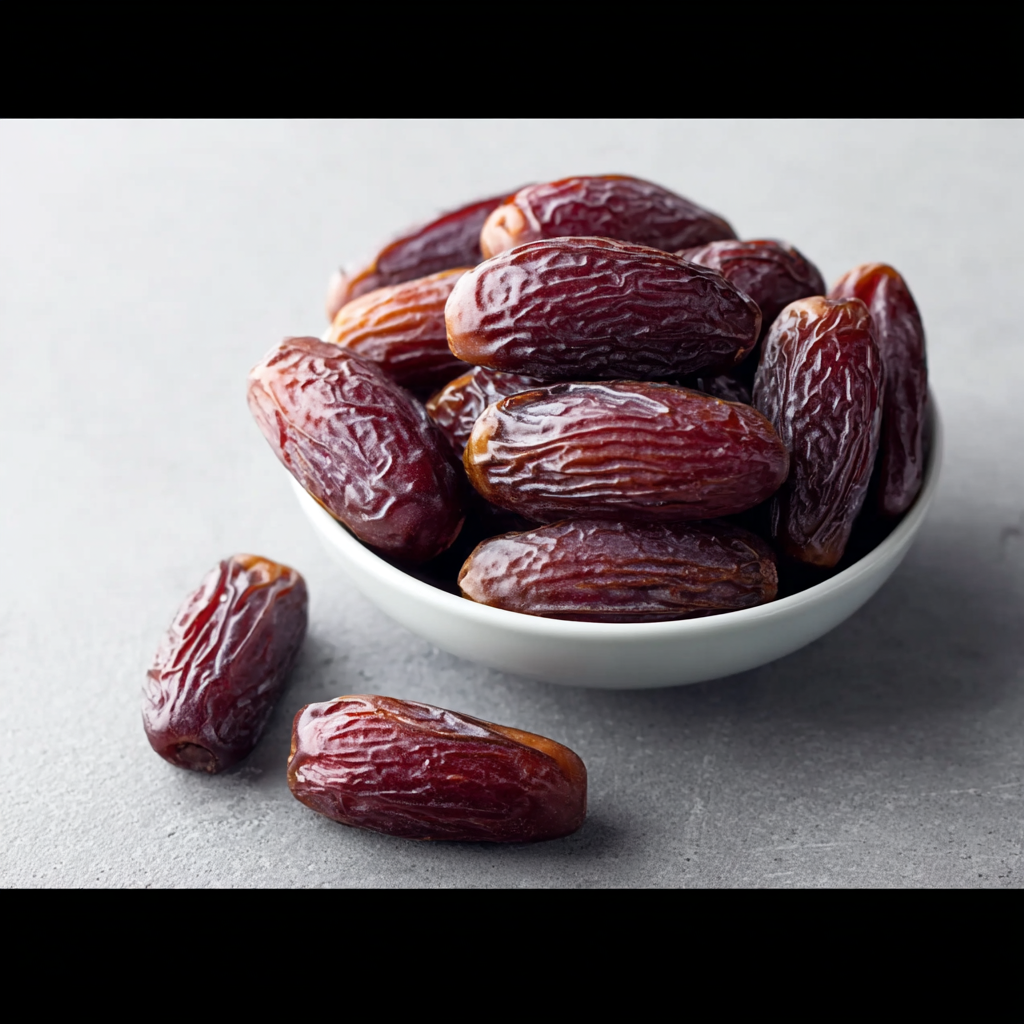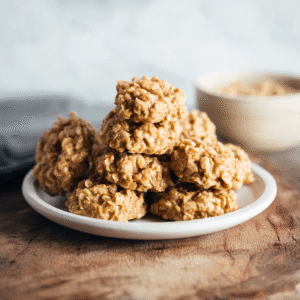Medjool dates nutrition facts go far beyond sugar and calories—they take me straight back to my grandmother’s kitchen. I remember the wooden cabinets, the smell of simmering stew, and a little crystal dish filled with glossy Medjool dates. She didn’t share those treats often—only if you were sitting still with good manners. That first bite was like caramel, only softer, stickier, and sweeter than anything store-bought.
Today, I keep Medjool dates in my pantry not just for nostalgia, but because they work. With two kids and a husband who asks “What’s for dessert?” every night, I’ve leaned hard into healthy sweets. Medjool dates became the star in our vegan date bark and my personal favorite, chocolate date bark. But behind that chewy sweetness, there’s real nutritional value worth knowing. In this article, we’ll explore Medjool dates nutrition facts, health benefits, and how to enjoy this natural sweetness in moderation.
For more on what makes Medjool dates a standout superfruit, check out our full guide Medjool date benefits.
Table of Contents
Table of Contents
What Makes Medjool Dates So Special?
Unlike many other dried fruits, Medjool dates aren’t artificially dehydrated—they’re allowed to dry naturally on the tree. This means they stay plump, soft, and packed with nutrients. Here’s what you get in just two Medjool dates (about 48g):
| Nutrient | Amount per 2 Medjool Dates |
|---|---|
| Calories | 133 |
| Carbohydrates | 36g |
| Sugar | 32g |
| Fiber | 3.2g |
| Protein | 0.8g |
| Fat | 0g |
| Potassium | 7% DV |
| Copper | 19% DV |
| Vitamin B6 | 7% DV |
| Magnesium | 6% DV |
For a fruit that fits in the palm of your hand, that’s a lot of nutrition. No wonder Medjool dates show up in everything from energy bites to even no-bake brownies. In fact, I’ve snuck them into no-bake cottage cheese brownies for added sweetness and fiber (the family never suspects a thing!).

Chocolate Date Bark: A Decadent No-Bake Treat
Ingredients
- 12 Medjool dates pitted
- 1/2 cup peanut butter or almond/sunflower butter
- 1/2 cup dark chocolate chips
- 1 tsp coconut oil optional
- Toppings: sea salt chopped nuts, toasted coconut
Instructions
- Line a baking tray with parchment paper.
- Flatten dates and press them into a rectangle base.
- Spread peanut butter evenly across the dates.
- Melt chocolate with coconut oil in microwave.
- Pour melted chocolate over the top and smooth it out.
- Add toppings while chocolate is still warm.
- Freeze for 15–20 minutes until set.
- Break into bark pieces and serve or store.
Notes
Optional toppings (nuts, coconut, etc.) are not included in the values above.
This recipe is naturally gluten-free and vegan when made with certified ingredients.
Stores well in fridge for 1 week or freezer for up to 1 month.
Nutrition
(Nutrition is estimated and will vary based on actual ingredients used)
Medjool Dates Nutrition Facts in Everyday Life
Are Medjool Dates Too High in Sugar?
That’s a question I hear often. It’s true that Medjool dates are sweet—each date contains around 16 grams of natural sugar. However, the key is that this natural sugar comes packaged with fiber and nutrients. One Medjool date also provides over 1.5 grams of fiber, which slows digestion and helps stabilize blood sugar levels by delaying the absorption of sugar into the bloodstream.
In fact, research has shown that despite their sweetness, Medjool dates have a low glycemic index. One clinical trial found Medjool dates have a GI of about 55, which is considered low. And a small study in people with diabetes found no significant blood sugar spikes even after they ate 7–10 dates in one sitting. This means enjoying a couple of dates won’t spike your blood sugar the way candy or soda might. I often use them as a natural sweetener in recipes like my 3-ingredient no-bake cookies instead of adding refined honey or syrup. It’s a sweet fix with some benefits.
Medjool dates are naturally sweet with a glossy, sticky texture. A bowl of these plump fruits makes a perfect energy-packed snack. Thanks to their fiber content, they release sugars more slowly than a candy bar, giving you a treat without the blood sugar crash. A bowl full of naturally sweet Medjool dates, perfect for snacking or using in energy-packed recipes.

How Many Medjool Dates Should You Eat a Day?
Moderation really is the sweet spot. Medjool dates are nutritious, but they are also calorie-dense, so you don’t need many to get benefits. Two to four dates a day is a great range for most people. In fact, dietitians often consider 2–3 Medjool dates per day to be one serving. That gives you the energy and fiber boost without overdoing the sugar or calories. They’re rich and satisfying, so a couple of dates can curb a sweet craving better than most processed snacks in the pantry.
Personally, I stick to two dates a day if I’m eating them straight as a snack. They’re so sweet and filling that two are enough to keep me happy. But when I’m blending them into a healthy no-bake dessert (like energy balls or a smoothie), I might use a few more and not mind having an extra piece of the final treat. Even then, I know I’m indulging in something far better than cookies or candy. The key is listening to your body and balancing with other foods—enjoy the natural sweetness, but save room for other fruits and nutrients in your day.
Medjool Dates and Your Health
Do Medjool Dates Offer Real Health Benefits?
Absolutely. They might look like little candy bites, but these chewy gems pack a surprisingly nutritious punch. Medjool dates are full of antioxidants such as flavonoids and carotenoids. Antioxidants protect your body’s cells from damage caused by free radicals – the kind of damage that can lead to heart disease, cancers, and other chronic illnesses. In fact, dates have been found to have one of the highest antioxidant contents among dried fruits, outperforming even figs and prunes.
Medjool dates also aid digestion. With over 3 grams of fiber in just two dates, they help keep things moving gently and naturally. One small study found that eating seven dates a day improved participants’ bowel regularity in just three weeks. So instead of reaching for a laxative tea, you might just enjoy a few dates and let their fiber work its magic.
Energy, Bones, and Brain Benefits
As a busy mom, I rely on quick fuel that doesn’t leave me crashing later. Medjool dates deliver exactly that. Their carbohydrates — mostly natural sugars — are the kind your body can use quickly and efficiently for energy. It’s no surprise that athletes often snack on dates for a quick pre-workout boost. Think of dates as little fuel packs from nature: high in carbs for instant energy, but also carrying potassium to help muscles and prevent cramps.
Medjool dates may also support bone health. They won’t replace a plate of leafy greens or a glass of milk, but they do contribute helpful minerals. Dates contain small amounts of calcium and are a decent source of magnesium, potassium, and copper. In fact, just two Medjool dates give you about 19% of your daily copper needs – and copper is a mineral that plays a role in bone strength and development. These minerals, along with others in dates, work together to keep your bones strong. While the amounts aren’t huge, every bit counts, especially when the snack is as delicious as this one.
What about the brain? Early studies suggest that the antioxidants in dates may help reduce inflammation in the brain and support long-term memory. Animal research has linked date fruit antioxidants to lower levels of inflammatory markers in the brain and even fewer plaque deposits associated with Alzheimer’s disease. That’s a promising sign that dates could be beneficial for brain health, though more research is needed to confirm these effects in humans. Still, it’s another good reason I keep Medjool dates in our family’s snack rotation – they’re feeding our bodies and maybe even our brains.
FAQ: Medjool Dates Nutrition Facts
Are Medjool dates the healthiest dates?
They’re certainly among the most nutrient-dense date varieties. Medjool dates are larger and often contain more potassium, calcium, and other minerals compared to common dates like Deglet Noor (Source : healthline.com). They’re rich in fiber, antioxidants, and natural sugars, giving them a better overall nutritional profile than many other dried fruits. In short, Medjools pack a lot of goodness into each bite, making them one of the healthiest choices if you’re looking for a sweet dried fruit.
How many Medjool dates should I eat per day?
A good moderate intake is around 2 to 4 Medjool dates per day. Two or three dates (about 40–60 grams) are considered one serving by many nutrition experts. This amount provides you with a nice boost of energy and fiber without overloading on sugar or calories. Of course, everyone’s needs are different – if you’re very active, you might enjoy a few more, but it’s best to start with a small portion and see how satisfied you feel.
Do Medjool dates raise blood sugar levels?
Not significantly, when eaten in moderation. Medjool dates have a low glycemic index, meaning they don’t cause the rapid blood sugar spikes that refined sugar does. Thanks to their fiber content, the natural sugars in dates are absorbed more slowly. Studies even show that people with diabetes did not experience big blood sugar fluctuations after eating dates compared to other carbs. So, while you should still keep portions reasonable, a couple of dates are generally a safe sweet treat that won’t wreak havoc on blood sugar.
Are Medjool dates anti-inflammatory?
Yes. Medjool dates are full of compounds that fight inflammation. In particular, they contain flavonoids and other polyphenols which have been shown to reduce inflammatory markers in the body. These antioxidants help calm oxidative stress and inflammation, which are linked to many chronic diseases. So, snacking on dates isn’t just good for your taste buds—it can be a small step toward lowering inflammation in your body.
How many calories are in 1 Medjool date?
One Medjool date contains roughly 66 to 70 calories. Most of those calories come from natural carbohydrates (sugars and a bit of fiber). For example, if two dates have about 133 calories in total, you’re looking at around 66–67 calories per date on average. It’s a compact source of energy. Along with those calories, you’re also getting vitamins and minerals like potassium, B6, and magnesium in that single date, which is a much better deal nutritionally than a 70-calorie candy.
Conclusion: Sweet, Smart, and So Worth It
Medjool dates nutrition isn’t just about counting calories—it’s about what those calories give you in return. With Medjool dates, you get natural energy, real fiber, helpful minerals, and a dose of antioxidants all wrapped up in a sweet package. They satisfy your sweet tooth in a way you don’t have to feel guilty about. In my kitchen, Medjool dates have earned their spot as a smart indulgence. Whether I’m blending them into a creamy dessert, stuffing them with nuts for an afternoon snack, or just eating them as-is, they offer far more than empty sugar. They’re sweet, they’re smart for your body, and they are so worth it.
Looking for ways to use Medjool dates now? Try:
→ Vegan Date Bark
→ Chocolate Date Bark
→ 3-Ingredient No-Bake Cookies
→ Healthy No-Bake Desserts
Want to save this guide for later or share it with fellow real-food lovers?
📌 Pin it on Pinterest or
📘 Share it on Facebook




Yummy, thank you